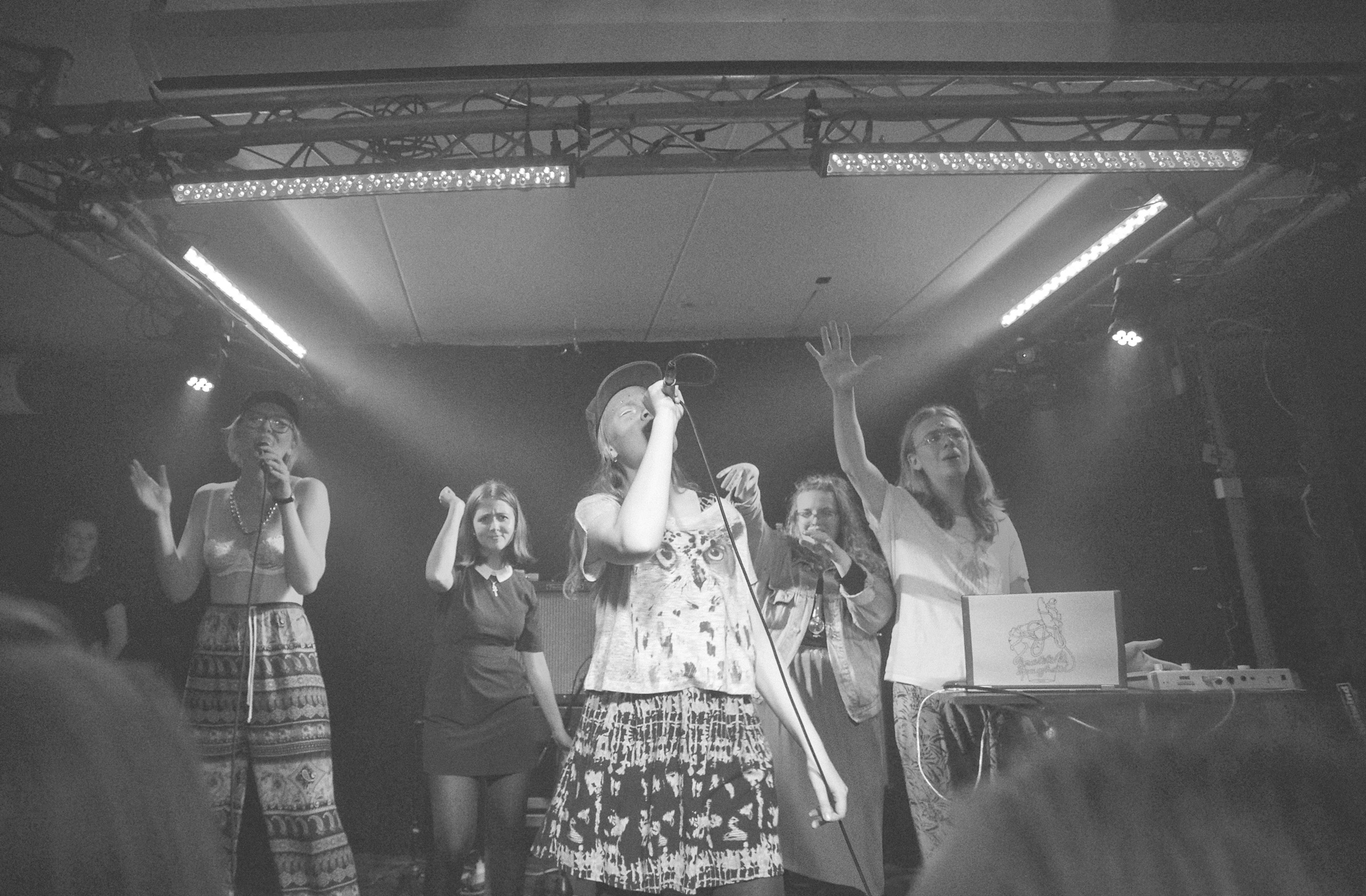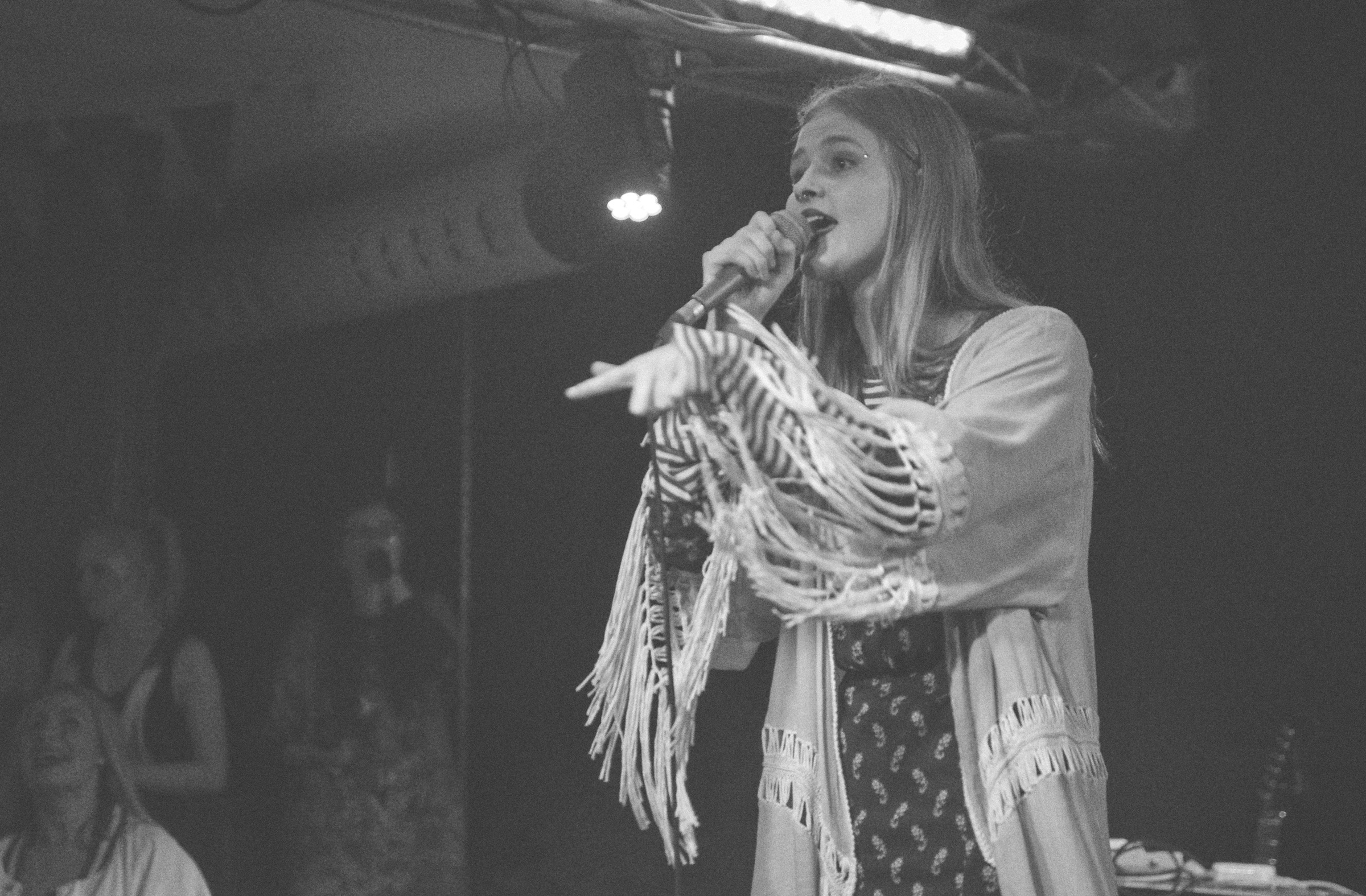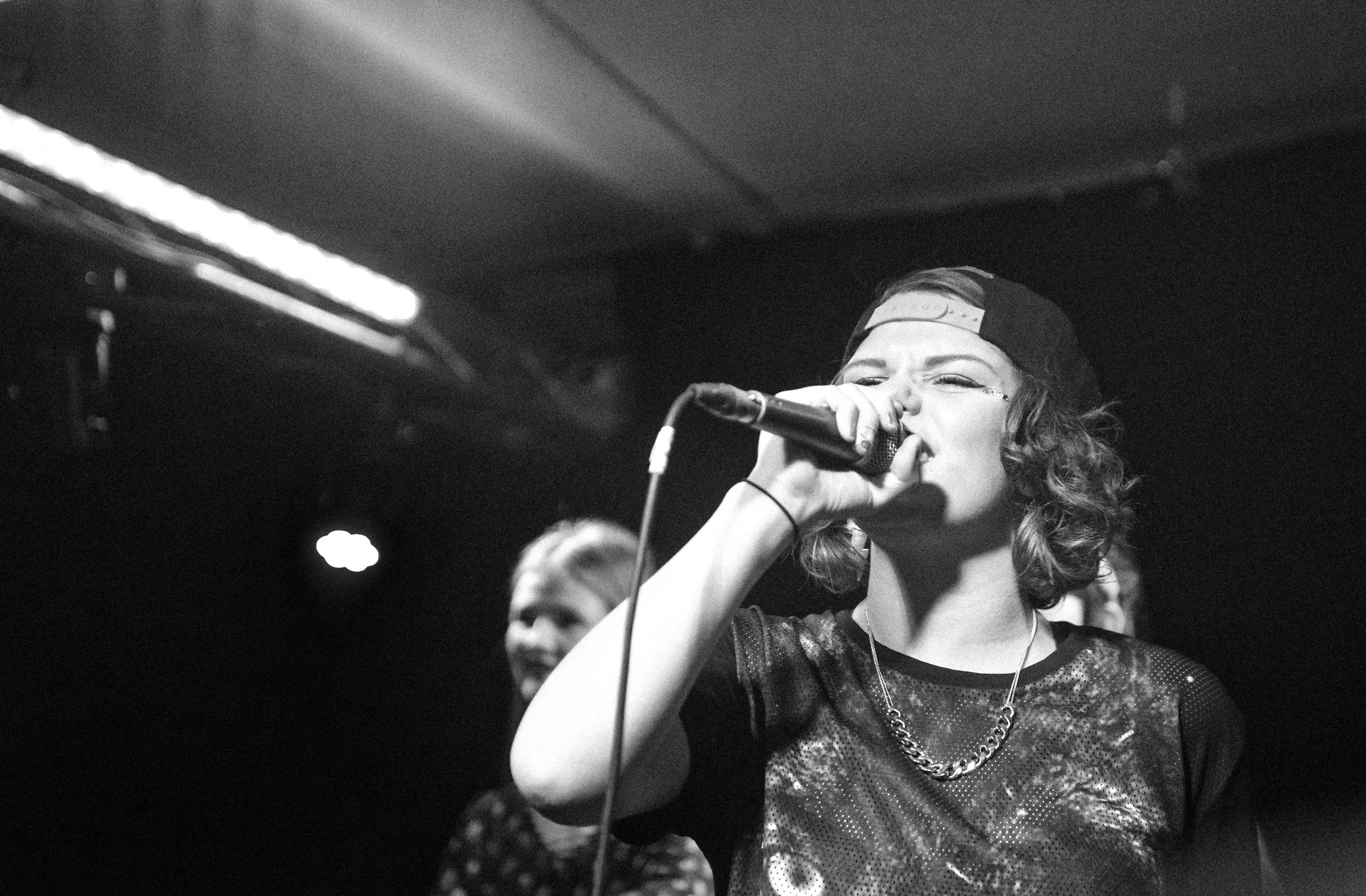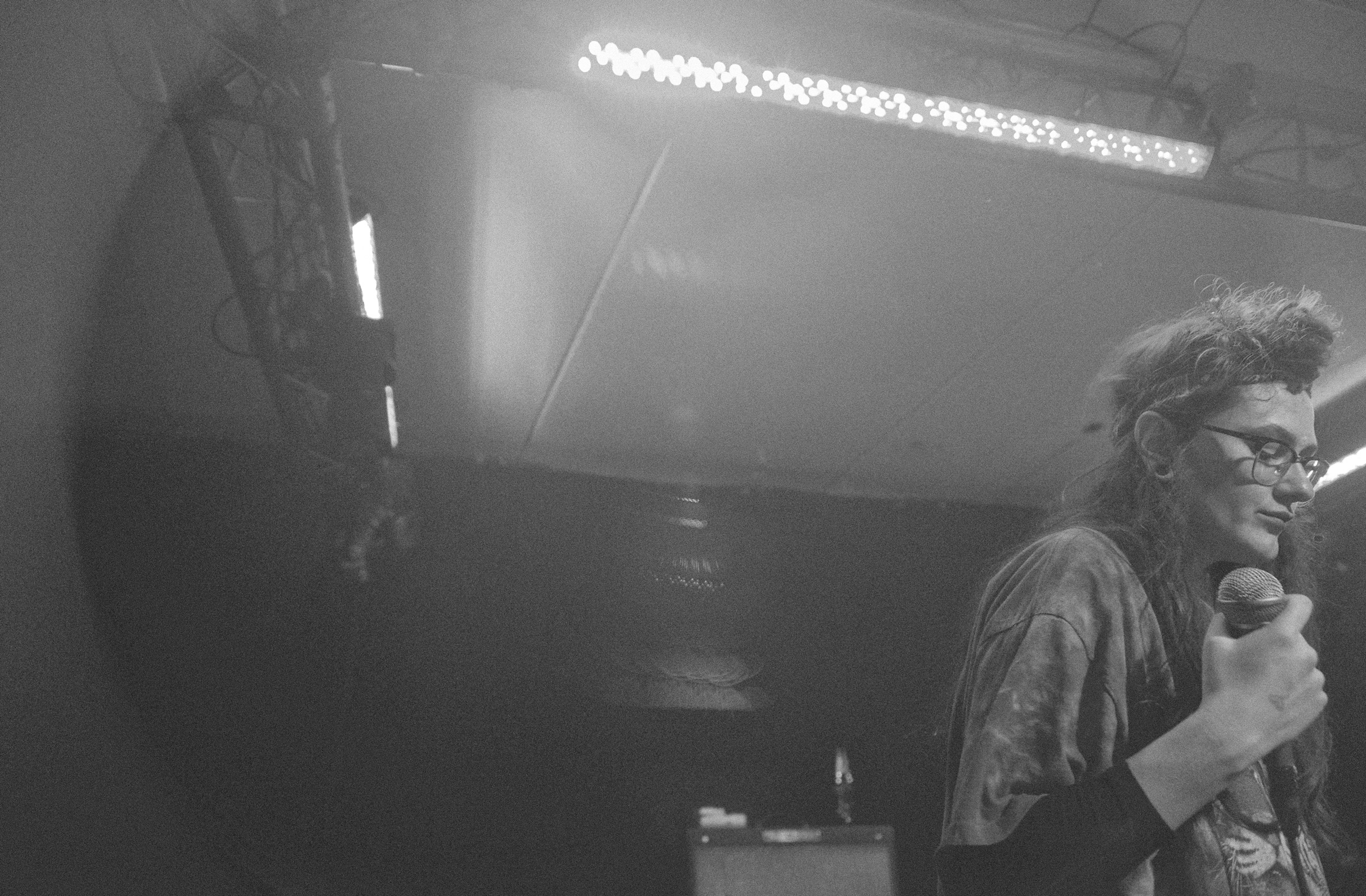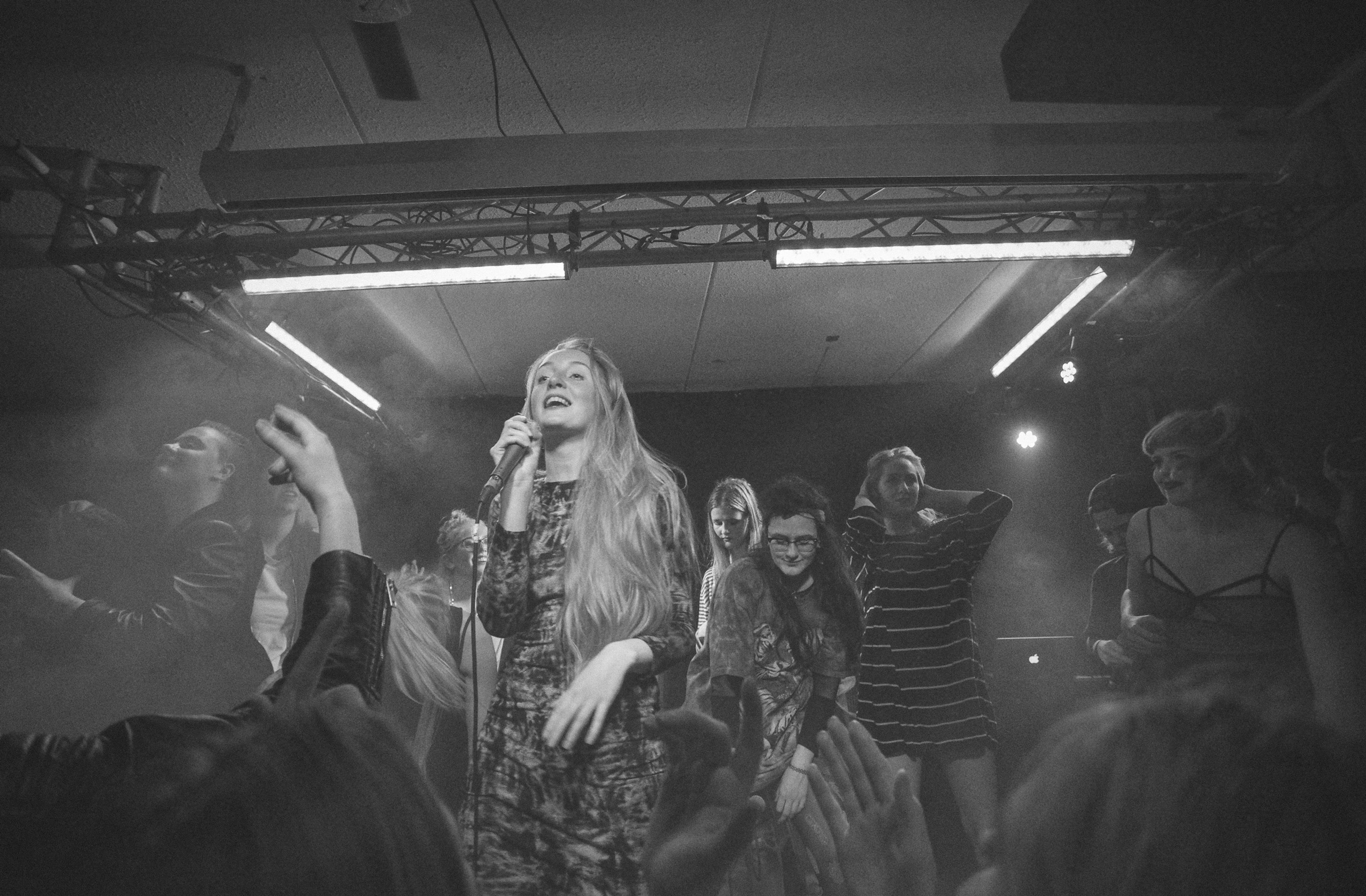Protagonist Issue ❶ ↓ Insights
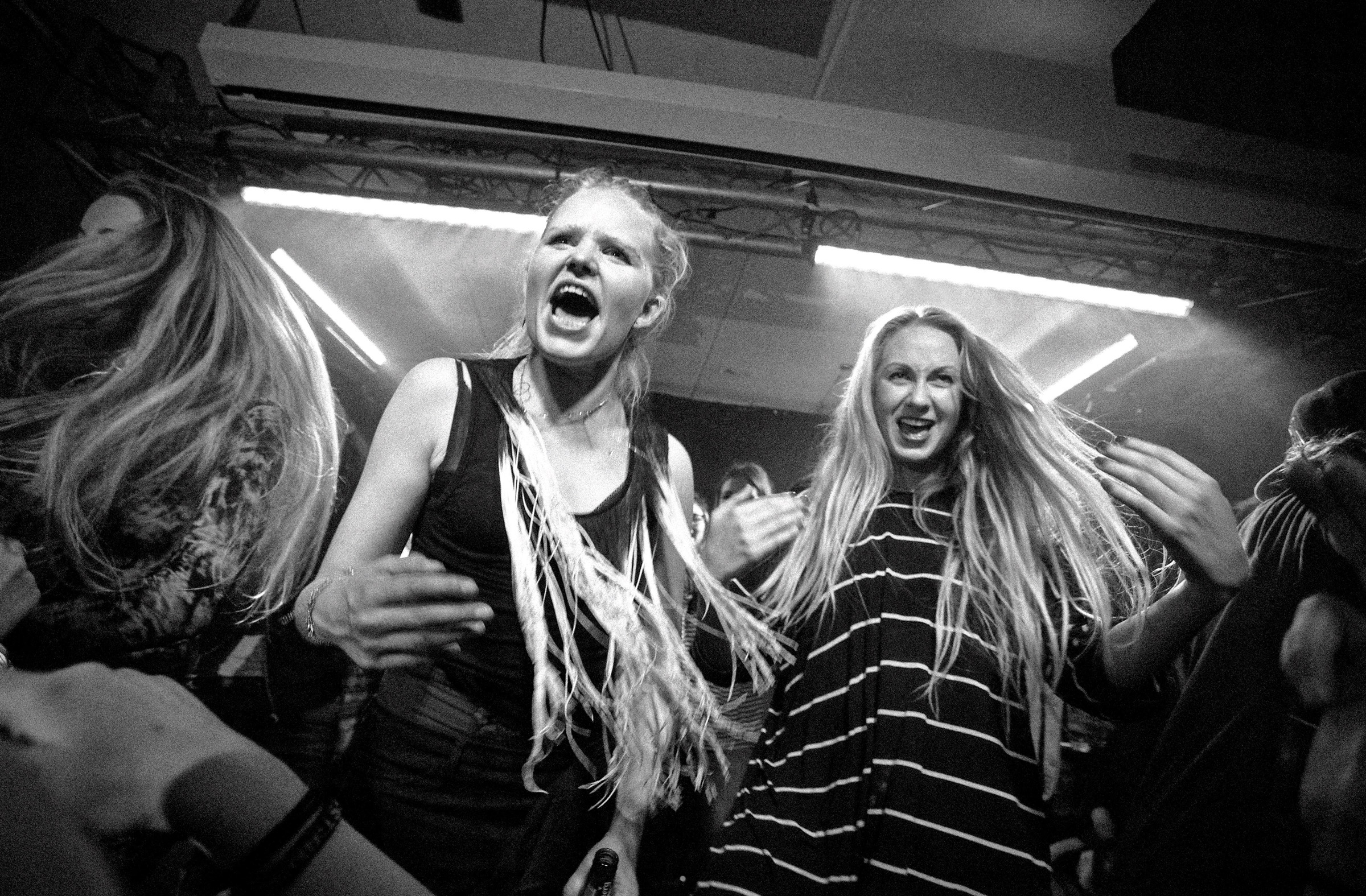
The Daughters of Reykjavik are on YouTube
She holds a hand up towards her face, fingers aligned like a gun, and her dark hair frames strong cheekbones that shift and lock as she chews gum and clicks her tongue against her teeth. Heavy base vibrates into the background of the video clip as another woman appears on screen and another; one after the other dancing in front of the grainy black and white lens.
They hold hand-painted signs that explain the content of the clip will not be tempered, tamed or censored as they beg the viewers to “Think of the children!” They smack you with their fast rolling and breathy Icelandic rap that whips out from the YouTube screen and into your chest. They are Reykjavíkurdaetur: The Daughters of Reykjavik.
The clip is “Ógedsleg”, which roughly translates to mean disgusting, hinting at recent criticism from a local male rapper who described the 19 strong all-woman clan as a disgusting and messy children’s party where everyone is invited to play. They said, “So, we created this film clip as a kind of disgusting birthday party, because that’s basically the concept and it’s working fine for us.”
The Daughters of Reykjavik have started a party where everyone is invited because they’re not a band, but rather a clan of femcees united by a drive to dismantle gender stereotypes. As they explain, this involves creating the opportunity to be a human beyond gender, and that “gender non-binary is a huge part of this concept, where you can be these three dimensional characters—female, male or whatever, and it doesn’t matter. We are making a platform for us to be that.”
Any woman can join the band if she wants to dedicate the time to performing. “It’s all female now because we’re kind of like a mirror on society in a way and as soon as we [women] feel comfortable in that society then we would start inviting males to join us as well.” In turn, The Daughters embrace the mix of women that come and go. “We wouldn’t even be a band or a collective if we had tried to control things,” they explain—and as a consequence of working hard to lose control, their music occupies the space between amateur and professional that in recent years has been enabled by the use of digital communication technologies.
The Daughters work hard to maintain this open-ended dynamic and, interestingly, they said this approach comes from the fact that most of The Daughters are digitally disconnected. “I don’t have Twitter, I don’t have Snapchat, I’m not active on Facebook. Many of the girls don’t use social media. I don’t have a smartphone either . . . ”
This is, in part, because word of mouth is able to replace the typical role of digital communication. Iceland is a small place, they tell me, “so small that ideas spread quickly. When you walk up to a person you know that they know . . . so every conversation is not starting on a point zero level, even when you walk up to a complete stranger . . . ”
The only contact most of The Daughters have with digital communication technologies is the group’s Facebook page or Twitter feed, and even in the minimal ecology of the latter, the notion of an undifferentiated whole is challenged. The Twitter-verse asks that you follow, retweet and favourite in a way that builds a single clear identity. Contrary to this, The Daughters said, “if you go through (Reykjavíkurdaetur’s) Twitter you should see nineteen different characters in that one account. You shouldn’t see this polished, censored one opinion because we don’t have one. We have nineteen girls and we all have opinions.”
It’s easy to use words like ‘remote’, ‘removed’, ‘isolated’ and ‘disconnected’ when describing Icelandic culture. The country sits atop the North Atlantic Ocean in the Norwegian Sea, and the rough-edges of its island borders are disconnected from Greenland on the country’s west coast, and from its east coast Icelanders gaze across the sea to Europe. With just over 300,000 people, the country is one of the most sparsely populated countries in Europe, and the country’s geography has worked to encourage Icelanders to fiercely insulate their Nordic origins.
But this history is being challenged alongside conceptions of isolation as Icelandic artists, bands and individuals tip-toe out into social media and collide with the world. The Daughters are an example of this, and in a number of instances they have been accused of naive cultural appropriation. It’s true that during the “Ógedsleg” clip they suck down on Coke bottles, lunge around the visual frame in an “American Legend” t-shirt, dance topless under an open New York Yankees baseball jersey, writhe in a Chanel bikini and pull at their Calvin Klein underwear. However, to The Daughters, this is active provocation; a way to push back across the transnational space opening up before them.
For The Daughters, such outside interpretations are based on the assumption of a disconnected and isolated Iceland—and, ironically, it is this assumption that is truly naive. They said English and American commentators “often apply biased opinions when they’re talking about a phenomenon,” and that “it is as if we’re in America, as if their history of appropriation is the same as ours. But it isn’t. They’re entering into a culture that has a completely different history and a completely different approach to cultures; and you can’t just apply the same rules for any country.”
Their least favourite manifestation of this pattern is the many lists around the world that regularly rank Iceland as the number one nation in which to be a woman. The lists include equal pay, equal working conditions and equal government support, but The Daughters argue they fail to encounter this scale of the Icelandic experience. These women do not want the kind of equality that suggests sameness. They do not want to be considered the same as men or the same as the dominant mainstream ideal. Feminism, for The Daughters, means a push to establish difference, and the necessity for difference. Here women and men deserve their own space to generate culture.
They concede that “the definition of feminism in Iceland is much more three-dimensional and more complex and fulfilling overall then it is in many other countries.” But, to The Daughters, this depth inspires intensified engagement with the gender politic in Iceland where the scale of experience produces a particular kind of attention. “Every voice has bigger value because there are fewer voices,” they explain, “here it’s so small, so points of view rapidly get both more visible and also more complex.”
They observed that in 2013 identifying as a feminist was still seen as very much taboo for women in Iceland, and that Reykjavíkurdaetur grew out of the peak of some misogynist commentary in Iceland at that time. Indeed, The Daughters had heard that many women were rapping in private, and they wanted to create a space for this to happen in public. “It had to be done for the sake of some kind of balance,” they explain. Social media was beginning to gain traction in concert with the idea of feminism and the gender non-binary concept in a community that “was exploding with this anger that had to find a place of being.” They created a YouTube video to promote the first event and, as word spread, “quite shockingly” two hundred people arrived to watch and perform in their first gig.
The Daughters observed that they pushed back against mainstream conceptions of femininity, and said “we can be feminine and feminine values are nice but women have to be able to be ugly and animalistic and terrible too.” That’s why the first rap night was called Reykjavíkurdaetur, and was designed as a space for women to express themselves freely. They said, “This was a platform for all of us to be not in a safe environment; we are clearly out of our comfort zone, but with the freedom to make mistakes.” Just as on this first night, in all their performances the stage is crowded with bodies, and members of the audience scrawl lyrics on the back of napkins and leap on stage and take the microphone. The local popular media picked up the title of their first event, and used it to describe this meeting of women as though it were a band. The Daughters, however, are not organised as a band and the energy of their music is bound to the clan, to the performance of the many.
The video clips they upload on YouTube are a subdued stand-in for the kind of energy they create on stage, but importantly, they allow a growing audience to access the clan. These videos are not getting a lot of air time in Iceland but they are making their way into other parts of Europe and the United States. As a result, The Daughters are facing some important challenges. For example, the demand that they begin conforming to the structure of a typical band as they’re booked for performances with larger audiences expecting a polished set, and interviewers from around the world have begun asking when the clan will begin singing in English.
As Iceland meets the digital, The Daughters are meeting the world. But for as long as possible they intend to walk the line between amateur and professional, local and global, male and female. This determination is best explained in their terms: “We don’t have a manifesto but I think we can all say that one of our goals, at least subconsciously, is that it wouldn’t matter that we’re women anymore. It wouldn’t have any impact on how people viewed us. People would view because they want to see these 19 different characters.” ●
_
Viktor Baskin is an Australian anthropologist, filmmaker and artist who is presently researching digital-visual practices among transgender communities as part of a globally situated, multi-sited and multi-mediated process of ethnography. viktorbaskin.com
